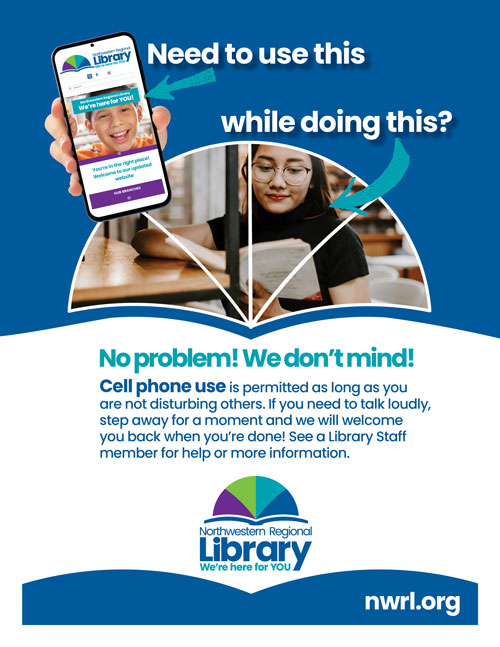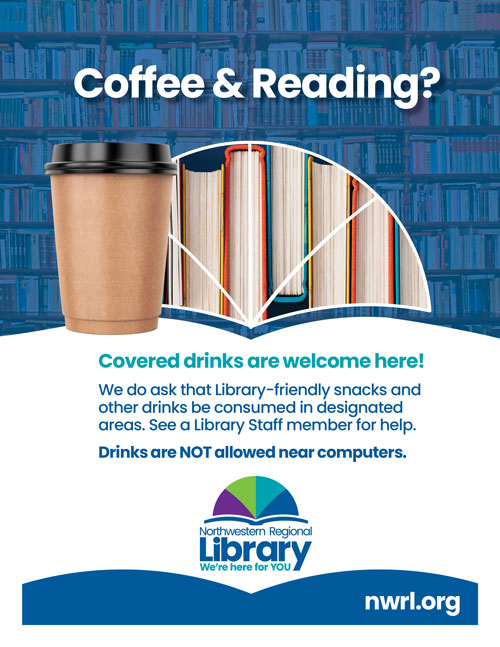



The public library environment should be conducive for all patrons to pursue their educational needs and their personal enjoyment. All patrons are expected to conduct themselves in such a way that the rights and privileges of others are not violated. This behavior is to be followed both in the library buildings and on the premises of the thirteen branch libraries of the Northwestern Regional Library.
Violators of this policy may be subject to restrictions on the use of the library up to and including permanent exclusion from all library facilities and grounds, as well as legal action.
*Any suspension in excess of six months may be appealed to the Regional Library Board.
The library is a doorway through which lifelong learning takes place. The Northwestern Regional Library and its member branch libraries welcome children of all ages. Our aim is to provide a pleasant and safe environment for all children who visit the libraries. While the library staff will do what they can to ensure this, it must be understood that parental responsibility for a child does not become a staff responsibility when the child enters the library.
The public library is a public building. In the interest of child safety the Northwestern Regional Library has established an Appropriate Behavior Policy and hereby sets forth the following policy for its member branch libraries.
Revised by NWRL Board, February 28, 2008
What Your Library Card Can Do for YOU:
Your Northwestern Regional Library Card provides these benefits:
Residents of Alleghany, Stokes, Surry and Yadkin counties and surrounding communities may get a FREE library card. Just stop by the circulation desk at any of the 13 branches of the Northwestern Regional Library system. To obtain a library card, proof of residency, such as a driver’s license with a local address is needed. Anything with your current address will be acceptable.
The members of 13 member libraries include libraries in Boonville, Danbury, Dobson, East Bend, Elkin, Jonesville, King, Lowgap, Mount Airy, Pilot Mountain, Sparta, Walnut Cove and Yadkin.
The library card holder agrees to:
Renewals
Renewals can be made in person, online or by calling the branch library. Renewals are limited to 3 for an item, with the exception of DVDs. DVDs and videos are allowed 1 renewal. Materials with a limited loan period, or that have been requested, cannot be renewed.
*Applicable at all NWRL Libraries effective March 1, 2019.
Loan Periods
To place a hold on library materials follow these steps:
The library will call, text or email you when your materials are available to be picked up.
Friendly User Tips:
INTERNET ACCEPTABLE USE AGREEMENT
Please Read This Document Carefully Before Accepting the Disclaimer
The Internet, as an information resource, enables the library to provide information that exists beyond its own physical collection. It allows access to ideas, information and commentary from all areas of the world. However, an unregulated and unrestrained medium changes daily.
As such, users must exercise good judgment and critical thinking as an information consumer in determining the quality and validity of information. The information found on the Internet may be misleading, unreliable, or false. Users should also be aware that some material available on the Internet might be disturbing, offensive, or illegal. The Library does not monitor and has no control over materials obtained on the Internet, and cannot be held responsible for its content.
It is the policy of the Northwestern Regional Library that children are entitled to a safe environment on the Internet, It is a violation of policy for any Internet user to use electronic or other means to threaten or harm or otherwise violate the safety of a minor. It is a violation for any person who makes unauthorized disclosure of, use of or dissemination of a minor’s personal identification information by means of the Internet, e-mail or any other electronic technology. It is a violation for any Internet user to access the Internet or other computer systems without authorization, which includes but is not limited to “hacking.”
Under the provisions of the Children’s Internet Protection Act, (CIP), filtering software is installed on all Internet-enabled computers provided by the library for the use of all patrons and staff. This filtering software is designed to protect against visual depictions that are obscene, child pornography, or is deemed harmful to minors.
At the request of adult patrons, (17 years old and up), filters will be disabled. Patrons must ask for filters to be disabled by a staff member.
When used responsibly and appropriately, the Internet has the potential to provide an unlimited number of educational opportunities. The primary purpose in providing such access is to make available a resource tool that expands the capacity of the library and the information it provides. We are pleased to offer our patrons access to the Internet.
In order to uphold the policies of the Northwestern Regional Library, and to maintain optimum service for all library users, the following guidelines have been created:
The following actions are NOT ALLOWED at any time:
Failure to adhere to the above guidelines will result in the immediate loss of Internet privileges for three years, which shall be noted on the patron’s automated library record. After three years, an individual may apply to the Executive Director of the Northwestern Regional Library for reinstatement of privileges.
An individual may appeal immediately to the Branch Librarian to discuss the specific internet use issue. If the patron is still unsatisfied with a decision terminating internet use, an appeal may be made in person to the Director of the Northwestern Regional Library. If still unresolved, a final appeal may be made to the full Northwestern Regional Library Board at the next regularly scheduled meeting.
Revised 10/16/03; Revised 06/17/04; Revised 04/21/05; Revised 2/19/10
The Internet is a global entity with not control of users and contents. Therefore, available resources may contain material of a controversial nature. The library does not monitor information accessed through the Internet. Library patrons use the Internet at their own risk. There are information resources, which are inappropriate to a library setting. Since the library is a public place, library staff has the authority to end an Internet session that does not conform to the library’s Internet Acceptable Use Guidelines.
The Northwestern Regional Library assumes no responsibility for the use of the Internet by children. It is the responsibility of the user (or parent, guardian, or caregiver) to determine what is appropriate. Parents of minor children (under the age of 17) must assume responsibility for their children’s use of the computers, computer resources, and the Internet at the library. Parents or guardians who wish to limit or restrict the access of their children should personally oversee their use of library computers.
The Northwestern Regional Library does not guarantee that the system will function error-free or uninterrupted, or that it will meet any specific requirements of the user. In addition, the library does not guarantee the accuracy of information obtained through the Internet. Information gained throughout this source is the responsibility of each originator/producer; users should be aware that not all sources of the Internet provide accurate, complete, or current information.
WARNING: Although virus detection software is installed on the library’s computers, it will not completely protect disks from the chance of getting a virus. Software downloaded from the Internet may contain a virus! The library advises patrons to use virus detection software on their personal computers.
The Northwestern Regional Library is not responsible for loss of data, damage or liability that may occur from patron use of the library’s computers.
All Internet users must accept an Internet Disclaimer before each Internet use.
I have read and understand the Library’s Internet policies and rules, and I accept the terms of use. I waive my right to any claim against the Northwestern Regional Library and/or its employees arising from the use of the Internet. I agree to refrain from displaying material on a terminal when so request by a Library staff member. I understand that a violation of any of the guidelines will result in loss of Internet usage privileges.
ACCEPT:______________________________
DATE:______________________________
Comments and posts containing the following content by patrons or staff are unacceptable:
Laptop computers are available for patron checkout from the circulation desk. Laptops are checked out on a first-come, first-served basis; they cannot be reserved.
LAPTOPS MAY NOT BE TAKEN FROM THE BUILDING. Removing a laptop or any of its peripherals from the Library will be considered theft. The loan period is 3 hours or less.
To borrow a laptop you must have a current, VALID Northwestern Regional Library Card, and must read and sign the Laptop Borrower’s Agreement. This agreement will remain on file until the expiration of the patron’s library card. After this, a new agreement must be signed.
If you have outstanding library fines or charges that prevent you from checking out other library materials, you will not be allowed to check out laptops. Under no circumstance will an individual be allowed to check out a laptop for another individual.
YOU MUST SAVE YOUR FILES to a cloud account (such as Google Drive on Chromebooks) or a personal flash drive before returning to the Library Service Desk. After the laptop is logged out, all files are deleted. The Library does not assume any responsibility for files left on the hard drive. You should not install applications on the laptops; you may print to a networked printer in the library if available.
You are responsible for loss, theft, or damage to laptops and accessories. DO NOT LEAVE LAPTOP UNATTENDED.
LOAN PERIODS
FINES/CHARGES
By my signature below, I acknowledge that I have read and agreed to all of the following statements for checking out a laptop computer from Northwestern Regional Library.
Signature ____________________________________ Date ___/____/____
Name Printed ________________________ Library Card # _______________
Staff Signature_________________________________________________
The American Library Association affirms that all libraries are forums for information and ideas, and that the following basic policies should guide their services.
Adopted June 19, 1939, by the ALA Council; amended October 14, 1944; June 18, 1948; February 2, 1961; June 27, 1967; January 23, 1980; inclusion of “age” reaffirmed January 23, 1996.
Although the Articles of the Library Bill of Rights are unambiguous statements of basic principles that should govern the service of all libraries, questions do arise concerning application of these principles to specific library practices. See the documents designated by the Intellectual Freedom Committee as Interpretations of the Library Bill of Rights. “Library Bill of Rights”, American Library Association, June 30, 2006. http://www.ala.org/advocacy/intfreedom/librarybill (Accessed August 14, 2018) Document ID: 669fd6a3-8939-3e54-7577-996a0a3f8952
The freedom to read is essential to our democracy. It is continuously under attack. Private groups and public authorities in various parts of the country are working to remove or limit access to reading materials, to censor content in schools, to label “controversial” views, to distribute lists of “objectionable” books or authors, and to purge libraries. These actions apparently rise from a view that our national tradition of free expression is no longer valid; that censorship and suppression are needed to counter threats to safety or national security, as well as to avoid the subversion of politics and the corruption of morals. We, as individuals devoted to reading and as librarians and publishers responsible for disseminating ideas, wish to assert the public interest in the preservation of the freedom to read.
Most attempts at suppression rest on a denial of the fundamental premise of democracy: that the ordinary individual, by exercising critical judgment, will select the good and reject the bad. We trust Americans to recognize propaganda and misinformation, and to make their own decisions about what they read and believe. We do not believe they are prepared to sacrifice their heritage of a free press in order to be “protected” against what others think may be bad for them. We believe they still favor free enterprise in ideas and expression.
These efforts at suppression are related to a larger pattern of pressures being brought against education, the press, art and images, films, broadcast media, and the Internet. The problem is not only one of actual censorship. The shadow of fear cast by these pressures leads, we suspect, to an even larger voluntary curtailment of expression by those who seek to avoid controversy or unwelcome scrutiny by government officials.
Such pressure toward conformity is perhaps natural to a time of accelerated change. And yet suppression is never more dangerous than in such a time of social tension. Freedom has given the United States the elasticity to endure strain. Freedom keeps open the path of novel and creative solutions, and enables change to come by choice. Every silencing of a heresy, every enforcement of an orthodoxy, diminishes the toughness and resilience of our society and leaves it the less able to deal with controversy and difference.
Now as always in our history, reading is among our greatest freedoms. The freedom to read and write is almost the only means for making generally available ideas or manners of expression that can initially command only a small audience. The written word is the natural medium for the new idea and the untried voice from which come the original contributions to social growth. It is essential to the extended discussion that serious thought requires, and to the accumulation of knowledge and ideas into organized collections.
We believe that free communication is essential to the preservation of a free society and a creative culture. We believe that these pressures toward conformity present the danger of limiting the range and variety of inquiry and expression on which our democracy and our culture depend. We believe that every American community must jealously guard the freedom to publish and to circulate, in order to preserve its own freedom to read. We believe that publishers and librarians have a profound responsibility to give validity to that freedom to read by making it possible for the readers to choose freely from a variety of offerings.
The freedom to read is guaranteed by the Constitution. Those with faith in free people will stand firm on these constitutional guarantees of essential rights and will exercise the responsibilities that accompany these rights.
We therefore affirm these propositions:
This statement was originally issued in May of 1953 by the Westchester Conference of the American Library Association and the American Book Publishers Council, which in 1970 consolidated with the American Educational Publishers Institute to become the Association of American Publishers.
Adopted June 25, 1953, by the ALA Council and the AAP Freedom to Read Committee; amended January 28, 1972; January 16, 1991; July 12, 2000; June 30, 2004.
A Joint Statement by:
Subsequently endorsed by:
The FREEDOM TO VIEW, along with the freedom to speak, to hear, and to read, is protected by the First Amendment to the Constitution of the United States. In a free society, there is no place for censorship of any medium of expression. Therefore these principles are affirmed:
This statement was originally drafted by the Freedom to View Committee of the American Film and Video Association (formerly the Educational Film Library Association) and was adopted by the AFVA Board of Directors in February 1979. This statement was updated and approved by the AFVA Board of Directors in 1989.